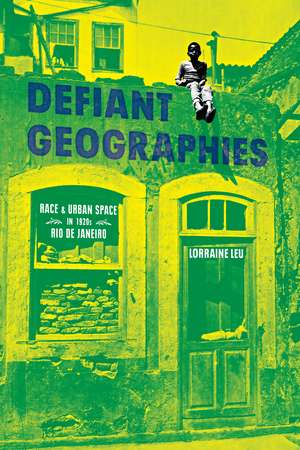Defiant Geographies: Race and Urban Space in 1920s Rio de Janeiro: Pitt Illuminations
Autor Lorraine Leuen Limba Engleză Hardback – 31 mar 2020
Din seria Pitt Illuminations
-
 Preț: 301.57 lei
Preț: 301.57 lei -
 Preț: 338.21 lei
Preț: 338.21 lei -
 Preț: 388.79 lei
Preț: 388.79 lei -
 Preț: 386.88 lei
Preț: 386.88 lei -
 Preț: 389.76 lei
Preț: 389.76 lei -
 Preț: 433.53 lei
Preț: 433.53 lei -
 Preț: 349.43 lei
Preț: 349.43 lei -
 Preț: 347.87 lei
Preț: 347.87 lei -
 Preț: 462.86 lei
Preț: 462.86 lei -
 Preț: 428.75 lei
Preț: 428.75 lei -
 Preț: 390.71 lei
Preț: 390.71 lei -
 Preț: 426.79 lei
Preț: 426.79 lei -
 Preț: 310.95 lei
Preț: 310.95 lei -
 Preț: 243.01 lei
Preț: 243.01 lei -
 Preț: 384.00 lei
Preț: 384.00 lei -
 Preț: 322.67 lei
Preț: 322.67 lei -
 Preț: 394.94 lei
Preț: 394.94 lei -
 Preț: 391.67 lei
Preț: 391.67 lei -
 Preț: 459.98 lei
Preț: 459.98 lei -
 Preț: 428.36 lei
Preț: 428.36 lei -
 Preț: 390.71 lei
Preț: 390.71 lei -
 Preț: 356.55 lei
Preț: 356.55 lei -
 Preț: 386.88 lei
Preț: 386.88 lei -
 Preț: 386.88 lei
Preț: 386.88 lei -
 Preț: 396.85 lei
Preț: 396.85 lei -
 Preț: 290.58 lei
Preț: 290.58 lei -
 Preț: 388.79 lei
Preț: 388.79 lei -
 Preț: 426.63 lei
Preț: 426.63 lei -
 Preț: 423.14 lei
Preț: 423.14 lei -
 Preț: 329.00 lei
Preț: 329.00 lei -
 Preț: 385.91 lei
Preț: 385.91 lei -
 Preț: 384.00 lei
Preț: 384.00 lei -
 Preț: 385.69 lei
Preț: 385.69 lei -
 Preț: 425.86 lei
Preț: 425.86 lei -
 Preț: 386.88 lei
Preț: 386.88 lei -
 Preț: 423.91 lei
Preț: 423.91 lei -
 Preț: 422.76 lei
Preț: 422.76 lei -
 Preț: 427.55 lei
Preț: 427.55 lei -
 Preț: 386.88 lei
Preț: 386.88 lei -
 Preț: 386.88 lei
Preț: 386.88 lei -
 Preț: 390.71 lei
Preț: 390.71 lei -
 Preț: 428.75 lei
Preț: 428.75 lei -
 Preț: 386.88 lei
Preț: 386.88 lei -
 Preț: 438.33 lei
Preț: 438.33 lei -
 Preț: 386.88 lei
Preț: 386.88 lei -
 Preț: 350.79 lei
Preț: 350.79 lei -
 Preț: 384.92 lei
Preț: 384.92 lei -
 Preț: 460.97 lei
Preț: 460.97 lei -
 Preț: 385.91 lei
Preț: 385.91 lei
Preț: 358.46 lei
Nou
Puncte Express: 538
Preț estimativ în valută:
68.61€ • 74.55$ • 57.67£
68.61€ • 74.55$ • 57.67£
Carte disponibilă
Livrare economică 31 martie-14 aprilie
Preluare comenzi: 021 569.72.76
Specificații
ISBN-13: 9780822946007
ISBN-10: 0822946009
Pagini: 238
Ilustrații: 37 b&w illustrations
Dimensiuni: 152 x 229 x 25 mm
Greutate: 0.5 kg
Ediția:1
Editura: University of Pittsburgh Press
Colecția University of Pittsburgh Press
Seria Pitt Illuminations
ISBN-10: 0822946009
Pagini: 238
Ilustrații: 37 b&w illustrations
Dimensiuni: 152 x 229 x 25 mm
Greutate: 0.5 kg
Ediția:1
Editura: University of Pittsburgh Press
Colecția University of Pittsburgh Press
Seria Pitt Illuminations
Recenzii
“In this carefully researched and beautifully written analysis of a decisive moment in the history of urbanization and modernization in Brazil, Lorraine Leu demonstrates how and why the racial projects of modernity all around the world routinely entail a distinct spatial imaginary rooted in anti-blackness. Her case study shows, however, that the dominant conflation of race with space did not go unchallenged, that the aggrieved and racialized denizens of the city created defiant geographies in which they could talk back to power and take back a measure of what had been stolen from them.” —George Lipsitz, author of How Racism Takes Place
“Brilliantly combining insights from history, geography, and cultural studies, Leu shows us not only how race makes space, but also how space constitutes racial difference in imaginations and in practices, creating a complex dynamic of domination and defiance that she traces as a continuous thread through more than a hundred years of Rio de Janeiro's history. That she manages this convincingly and in rich detail - amassing textual, visual, and sonic images - for the dense, striated, and fractal spaces of the city is quite an achievement.” —Peter Wade, University of Manchester
“Leu’s attention to the particularities of anti-Blackness within the multiethnic urban context of early twentieth-century Rio make this text especially welcome to scholars of urban studies in the Americas.” —H-Net Reviews
“Wonderfully written, compellingly argued, and richly documented, Lorraine Leu’s Defiant Geographies: Race and Urban Space in 1920s Rio de Janeiro is a decisive contribution to understanding how race and spatiality were strongly intertwined in the making of Rio de Janeiro’s urban reforms in the early decades of the twentieth century.” —Hispanic Review
“Lorraine Leu explores how the urban reform initiatives of 1920s Rio de Janeiro were underpinned by racial displacement and how black and poor white immigrant communities sought to defiantly resist these processes. This is a welcome and accessible contribution to Brazil’s anti-racist urban theory and will be a fundamental read for anyone interested in race, urban space, urban renewal, and displacement.” —LSE Review of Books
Notă biografică
Lorraine Leu is associate professor at the University of Texas, Austin, where she holds a joint appointment in the Lozano Long Institute for Latin American Studies (LLILAS) and the Department of Spanish and Portuguese. She is the author of Brazilian Popular Music, and coedited the anthology Latin American Cultural Studies: A Reader.
